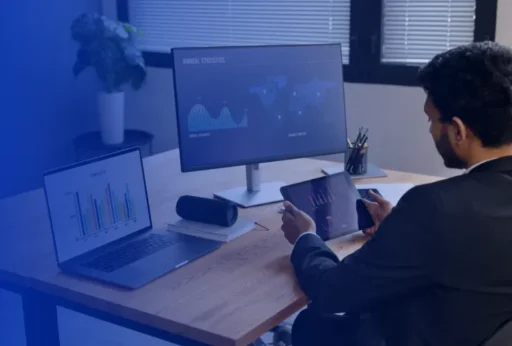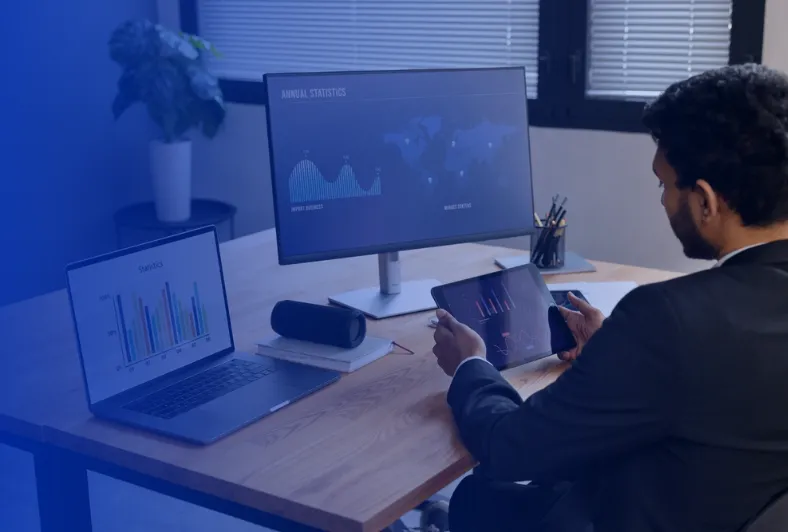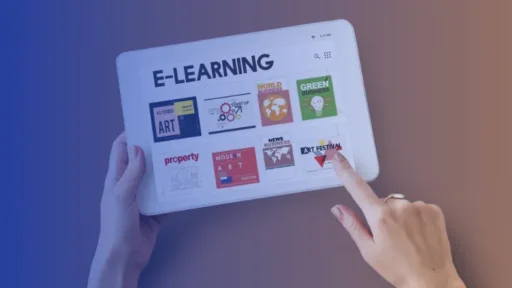If you’re a business or organization looking to comply with the Digital Personal Data Protection Act (DPDPA), it’s important to consider tools that help manage privacy risks and protect your data. One of the best ways to do this is by using DPIA (Data Protection Impact Assessment) software. These tools help you identify, assess, and mitigate privacy risks associated with your data processing activities, ensuring that your organization stays compliant with the DPDPA. In this guide, we’ll take a look at some of the top DPIA software solutions that can help you meet your compliance needs.
1. Concur Consent Manager
Overview: Concur Consent Manager simplifies privacy operations and ensures compliance with data protection laws, such as the DPDPA. This software is designed to manage consent, track data discovery, and streamline breach handling for businesses.
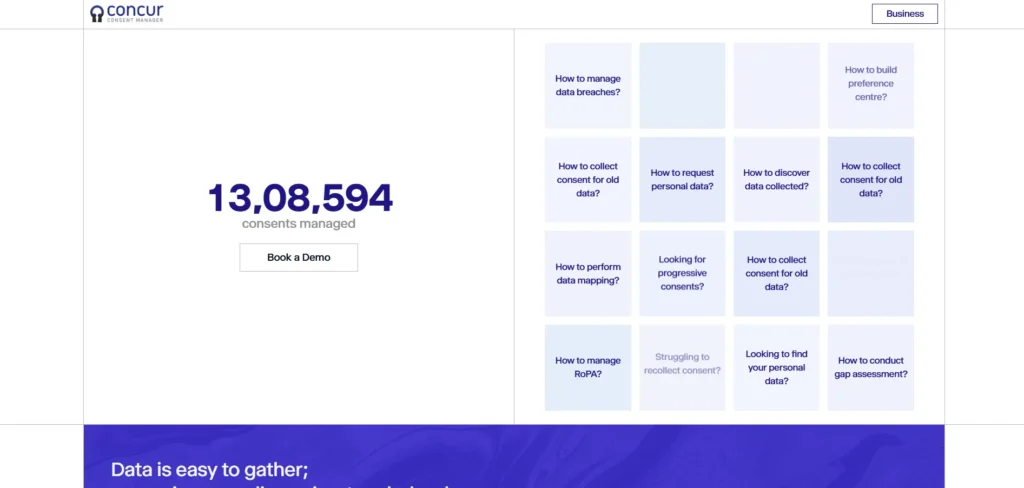
Key Features:
- Automated Consent Management: Tracks consent preferences and ensures transparency.
- Breach Handling: Quickly identifies and reports breaches to remain compliant.
- Data Discovery: Helps identify data processing activities to ensure all personal data is managed according to the law.
Pros:
- Easy-to-use interface that simplifies privacy management.
- Automates key privacy processes, saving time and effort.
- Helps businesses meet DPDPA requirements.
Cons:
- The advanced features may require additional setup.
2. Clarip DPIA Software
Overview: Clarip helps organizations simplify the privacy compliance process. With Clarip’s DPIA software, businesses can easily evaluate privacy risks, manage assessments, and ensure compliance with the DPDPA.
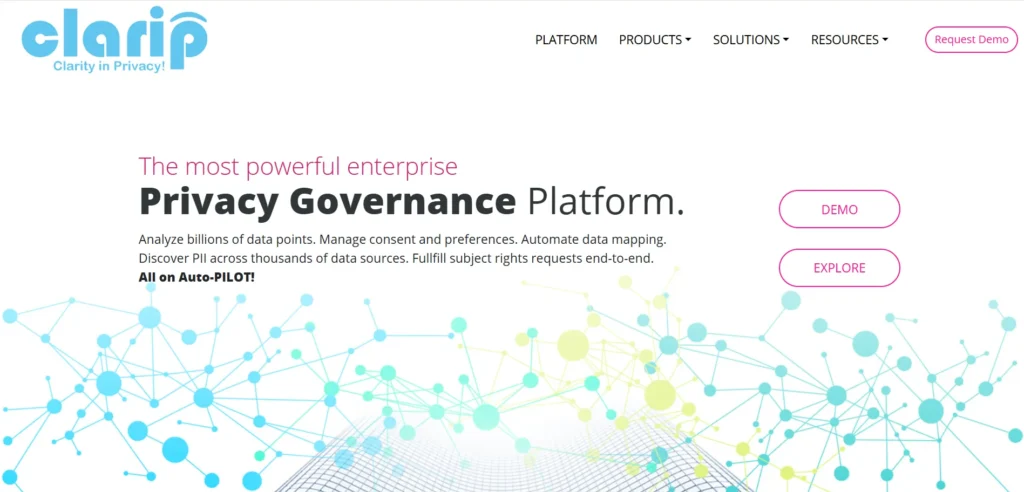
Key Features:
- Risk Identification: Highlights privacy risks and offers actionable solutions.
- DPIA Automation: Streamlines the entire DPIA process for quicker results.
- Real-Time Compliance Monitoring: Ensures ongoing compliance with DPDPA and other privacy laws.
Pros:
- Straightforward and easy-to-use interface.
- Reduces the complexity of privacy assessments.
- Comprehensive support for global privacy regulations.
Cons:
- Can be expensive for smaller businesses.
- Lacks some advanced features found in other solutions.
3. Mandatly Compliance Management
Overview: Mandatly offers a solution tailored to businesses seeking to comply with GDPR and similar data protection laws, such as the DPDPA. The platform includes tools for automating DPIAs and managing data flows within an organization.
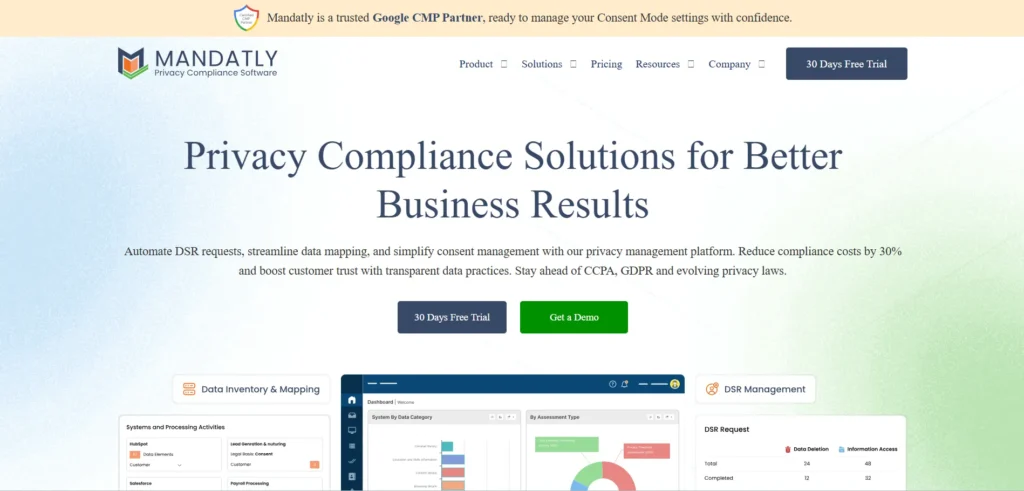
Key Features:
- DPIA Automation: Makes DPIA assessments faster and more efficient.
- Data Mapping: Helps businesses track and manage data flows to ensure compliance.
- Privacy Compliance Dashboard: Allows businesses to track their overall compliance status.
Pros:
- Easy-to-use interface.
- Tailored to GDPR and similar laws, including DPDPA.
- Affordable pricing for small to medium-sized businesses.
Cons:
- Limited support for more complex data processing scenarios.
- Lacks some advanced features found in other platforms.
4. OneTrust Privacy Automation
Overview: OneTrust is one of the top privacy management platforms for automating DPIA assessments and ensuring compliance with privacy laws like DPDPA. This platform allows businesses to conduct detailed privacy risk assessments and keep track of their compliance status.
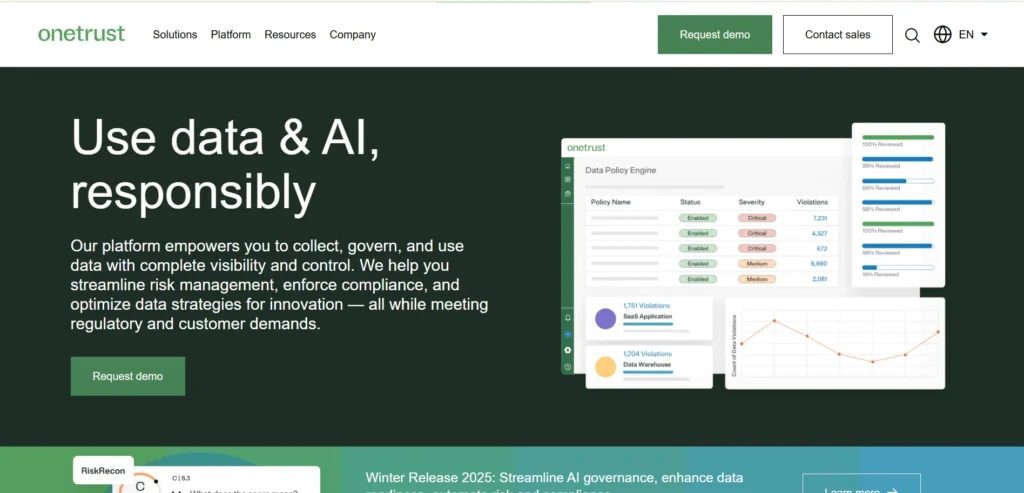
Key Features:
- Automated DPIA Assessments: Makes the process of evaluating data protection risks fast and easy.
- Compliance Monitoring: Tracks your compliance with global privacy laws, including DPDPA.
- Customizable Templates: Allows businesses to tailor assessments to their specific data processing activities.
Pros:
- Automates the entire DPIA process, reducing manual work.
- Provides clear, detailed reports for compliance auditing.
- Customizable to suit any organization’s needs.
Cons:
- Can be pricey for smaller companies.
- The user interface may take time to learn for new users.
5. Securiti
Overview: Securiti offers an AI-powered platform for privacy management, compliance, and data security. It helps businesses automate DPIAs and manage privacy assessments efficiently, ensuring DPDPA and other regulatory compliance.
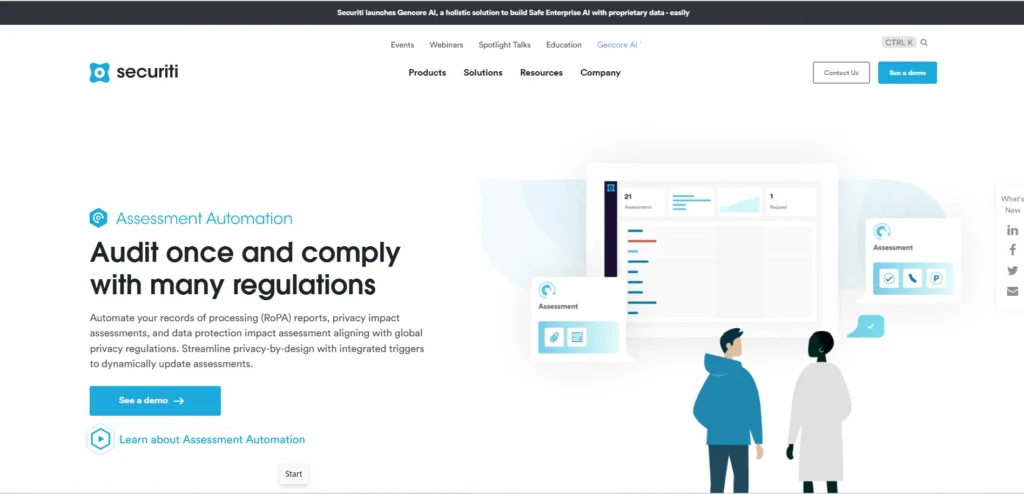
Key Features:
- Automated DPIA: Simplifies conducting privacy risk assessments and audits.
- AI-Powered Risk Detection: Detects privacy risks and automates data privacy operations.
- Real-Time Monitoring: Tracks compliance and provides real-time insights into privacy practices.
Pros:
- AI-powered features make risk identification and compliance tracking faster.
- Offers comprehensive privacy automation, covering multiple privacy laws.
- Seamless integration with other business tools and workflows.
Cons:
- Can be pricey for smaller organizations.
- Some features may require advanced knowledge of privacy regulations
What is the Primary Purpose of DPIA Software?
DPIA software is designed to help businesses identify and reduce the risks associated with data processing. The primary purpose is to streamline the process of conducting Data Protection Impact Assessments, ensuring compliance with privacy laws like the DPDPA. By using DPIA software, businesses can protect individuals’ data, reduce privacy risks, and meet legal obligations without a complicated manual process.
How Often Should Businesses Conduct a DPIA?
Businesses should perform a DPIA whenever they introduce new data processing activities or technologies that could potentially impact individual privacy. Regular evaluations help ensure that businesses are consistently meeting privacy standards and mitigating any emerging risks.
For example, businesses should conduct a DPIA when:
- Launching new data processing technologies.
- Implementing new services that process personal data.
- Changing how personal data is processed or shared.
Can DPIA Software Replace a Data Protection Officer (DPO)?
DPIA software is helpful in identifying risks and ensuring compliance, but it cannot fully replace a Data Protection Officer (DPO). A DPO is crucial for overseeing privacy operations, managing compliance, and acting as a liaison between regulatory bodies and data subjects.
DPIA software simplifies the technical aspects of privacy management, but a DPO is needed to interpret legal obligations, address complex privacy concerns, and provide strategic advice.
Conclusion
Choosing the right DPIA software is key to ensuring DPDPA compliance and protecting personal data. Platforms like Concur Consent Manager is great for automating DPIA assessments and simplifying the compliance process. However, remember that while DPIA software can make managing data protection easier, the expertise of a Data Protection Officer (DPO) is still essential for comprehensive privacy management.
Key Takeaways:
- DPIA Software helps businesses minimize privacy risks and ensure compliance.
- Choose software that automates DPIAs, provides customizable templates, and tracks compliance.
- OneTrust and Clarip offer advanced automation features for large businesses.
- A DPO is still needed for strategic compliance and privacy oversight.
Disclaimer: This article is intended for educational and informational purposes only. The DPIA software tools mentioned are listed alphabetically and not ranked by effectiveness or preference. Inclusion in this guide does not imply endorsement or certification of compliance with the Digital Personal Data Protection Act (DPDPA) or any other law. All information is based on publicly available sources and may change over time. Readers should perform their own due diligence and consult legal or data privacy professionals before making any compliance-related decisions.


